Tales from Paradise
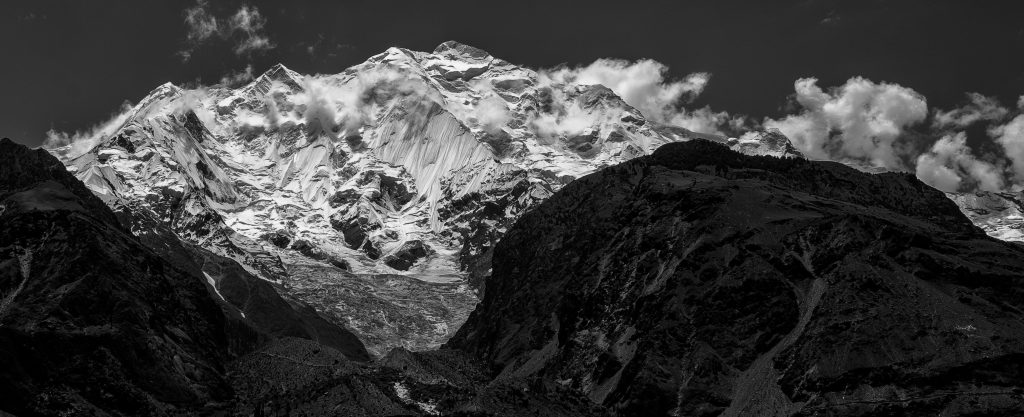
The mighty Rakaposhi
It was a hot and humid June in Karachi. My wife had flown off to visit our children and other family in the US and Canada. I was home alone, mostly seeking refuge in an air-conditioned room and gazing at the proverbial navel. Anticipating this situation, I had wisely booked a seat for a flight from Islamabad to Gilgit. It is virtually impossible to get such a flight to Gilgit or Skardu at a short notice and a minimum two weeks advance booking is necessary. As has become my travel style lately, I booked no hotels and no return tickets.
I called up two of my former travelling buddies, Tariq (alias the mountain goat) and Jamal (alias the bureaucrat); their aliases represent their style of trekking. Both had other commitments. So it was just me, with my shadow to keep me company. But anything was better than catching brain fungus due to inactivity in hot and humid Karachi. So off I flew to Islamabad, but not before the flight was rescheduled five times over a period of 24 hours. This was not a good start.
The flights from Islamabad to Gilgit are notorious for their frequent cancellations due to poor weather conditions. So it was with great trepidation that I arrived at Islamabad airport for my flight to Gilgit. But luck was kind to me and the flight left as scheduled. The passengers were almost all families and groups of young people on vacation.
The flight to Gilgit is indeed breathtakingly beautiful. The sight of miles of snow-capped mountains and forbidding bare rocks is both majestic and awe-inspiring. The power of nature that has sculpted such terrain is indeed humbling.
The plane flew low between two peaks and landed in Gilgit at an airport cradled between the gigantic mountains that seemed a stone’s throw away. I felt my spirits rising; the heat and dust of Karachi was eons behind me. As I walked out of the plane, an armyman stepped up to me and inquired deferentially if I was General Mukhtar. I was tempted to say yes and see where it took me but I just said that alas I was not.
I walked out of the terminal looking for a taxi but failed to spot one. Then I figured out that there is no such thing as a formal taxi in Gilgit and anything that moved could be considered a taxi. So I approached a putative taxi and asked to be taken to the PTDC hotel (a friend had recommended it). The taxi man quoted Rs. 500 fare and off we went. We had not gone more than a few hundred yards when the driver informed me that our destination had arrived. Clearly, the driver had decided that I was to be taxed for arriving from the big, bad city of Karachi. At the PTDC I was lucky to get the last empty room. It was very basic but reasonably clean; the rent Rs. 4,000 a night.
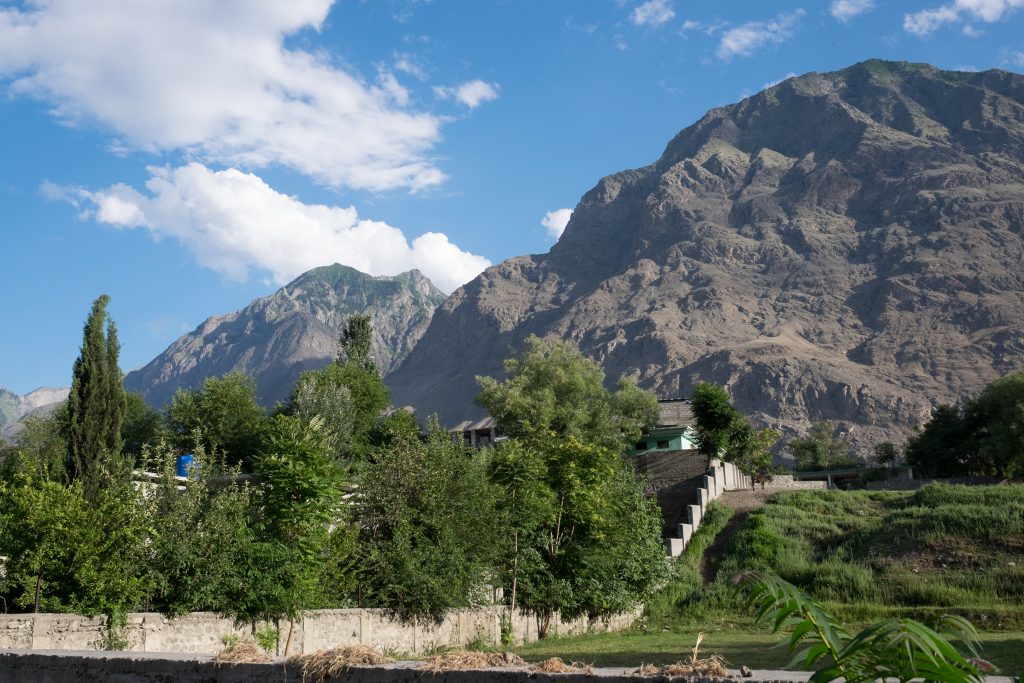
Gilgit near Chinar Bagh Area
As a walked into the room after doing some quick paperwork at the reception, I was surprised to see a bottled cold drink, a bagful of cherries and another of apricots in the room. I had no idea who had put these things there. An hour later there was a loud knocking on the door. I opened it to see my taxi driver looking quite flustered and in a great hurry. Without saying a word he barged into the room, put a prayer mat on the floor and started saying his prayers. After the prayers he made himself comfortable on the bed and started a general conversation. I was quite amused by his refreshing conviviality, something I had never seen in any other place I had visited. It turned out it was he who had put the fruit and drink in the room. He asked me if I would like to hire him to go to Karimabad the next day. I did not commit and he went away. All this time he was gentle, soft spoken and never pushy; traits that I later realized were common to the all the local people I met. Coming from Karachi, it was indeed as refreshing as the fresh air of the mountains.
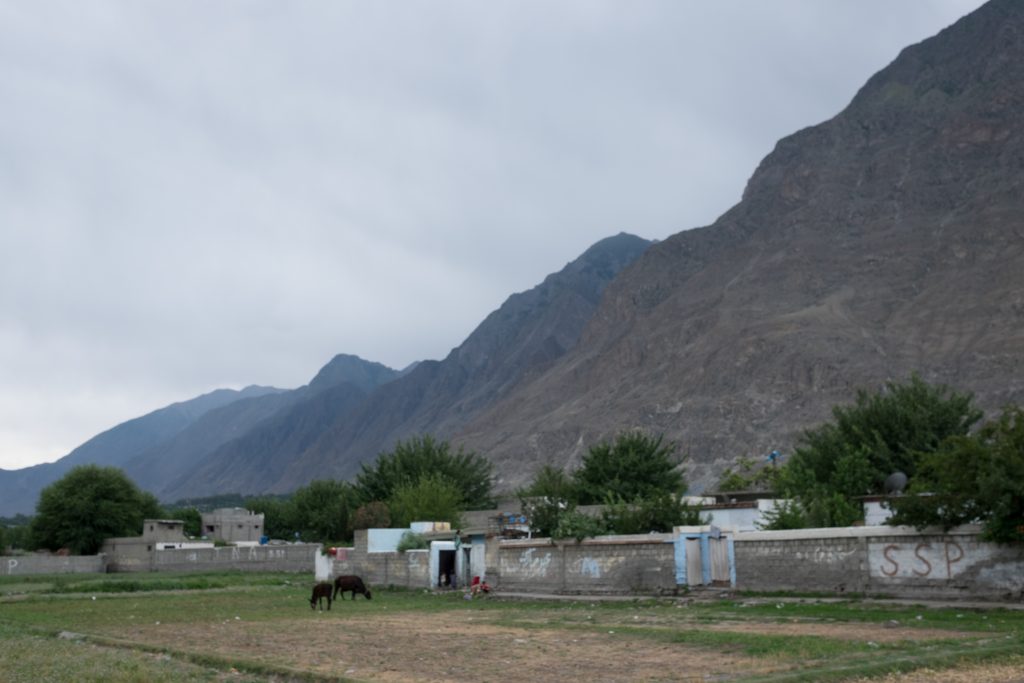
A peaceful village in Gilgit, a short walk from the PTDC Motel
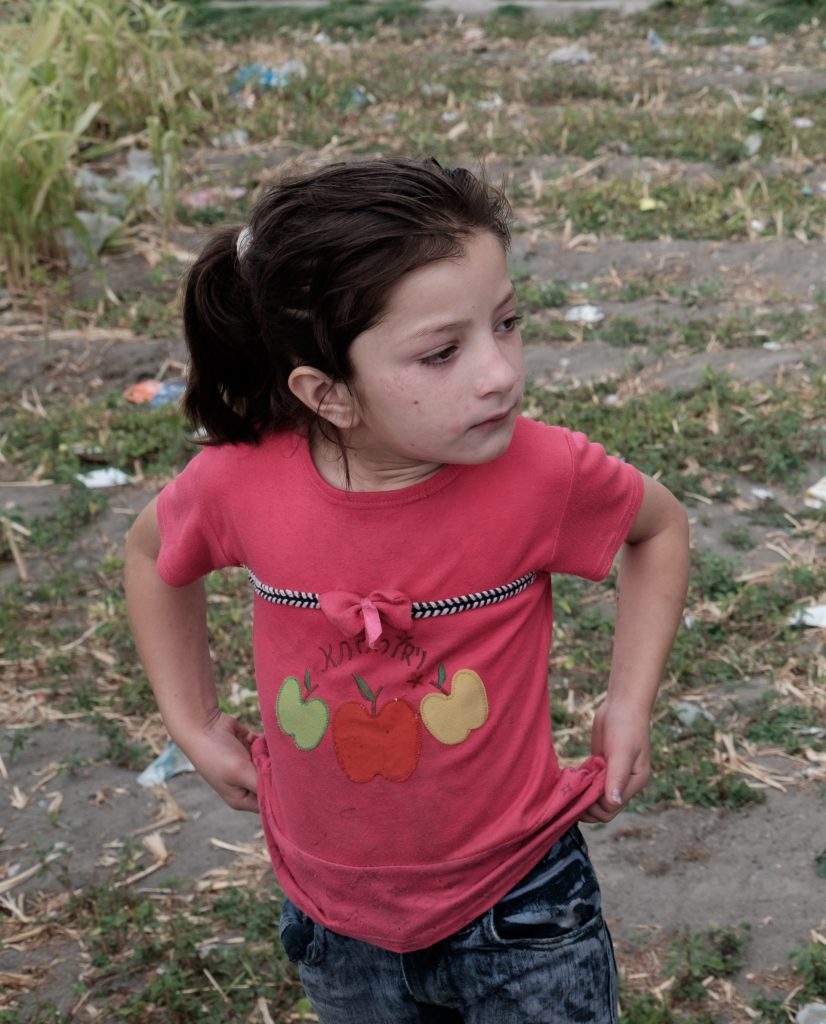
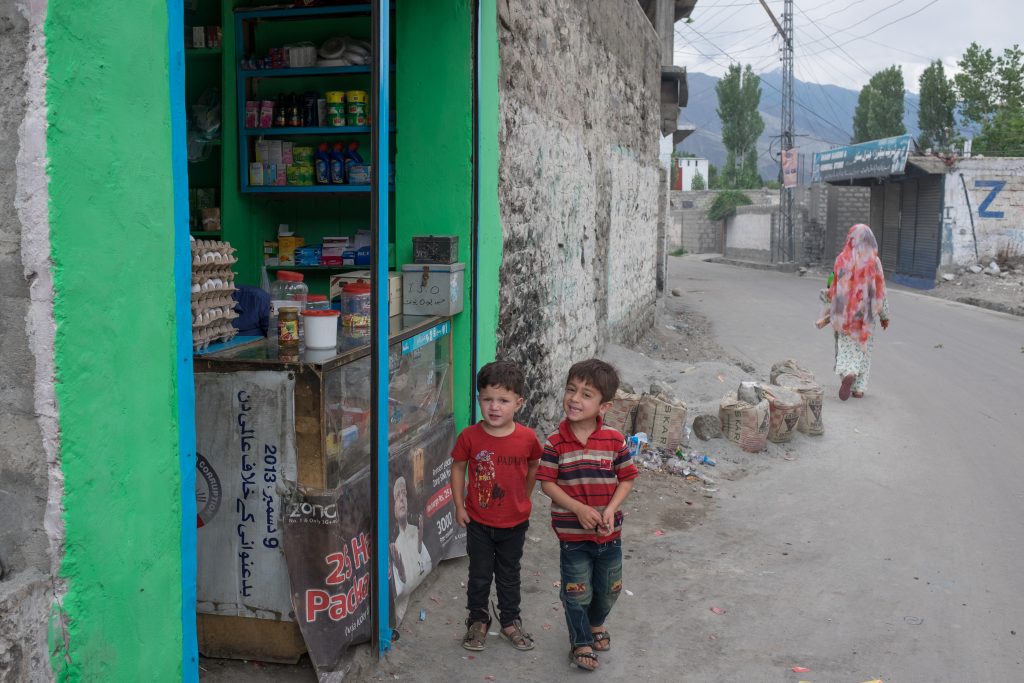
The most beautiful children in the world are to be found in Gilgit / Hunza!
To put is simply, there is nothing in Gilgit to keep a tourist. Yet, I did find two interesting walks. A stroll from the PTDC hotel leads to the Chinar Bagh area where the fast flowing Gilgit River and a number of suspension bridges made for a very interesting ambience. The second little walk was to a small village-like setting with green fields and a sense of peace and tranquility pervading it. Here you see friendly little children that run up to you and greet you in English! I realized how good-looking these children were. They had the best of Asian and Western features; beautiful eyes, a unique shy smile, and beautiful skin. Later, I asked my driver why are the people of Gilgit and Hunza so good-looking? “This is because of the clean mountain air and the fruit we eat,” he replied. I made a mental note to breathe deeper and eat a lot of fruit in the hope that some of the mountain beauty would rub off on me.
The next day I got a call from the taxi driver, saying that he was in Hunza but if I wanted, his brother could bring me to Hunza. By this time I had done my homework on the fares and agreed to pay Rs. 3,000 for the ride. Public transport is not good in that area and tourists have to use taxis most of the time. Travelling alone can become expensive as you sometimes have to hire an empty taxi just for yourself.
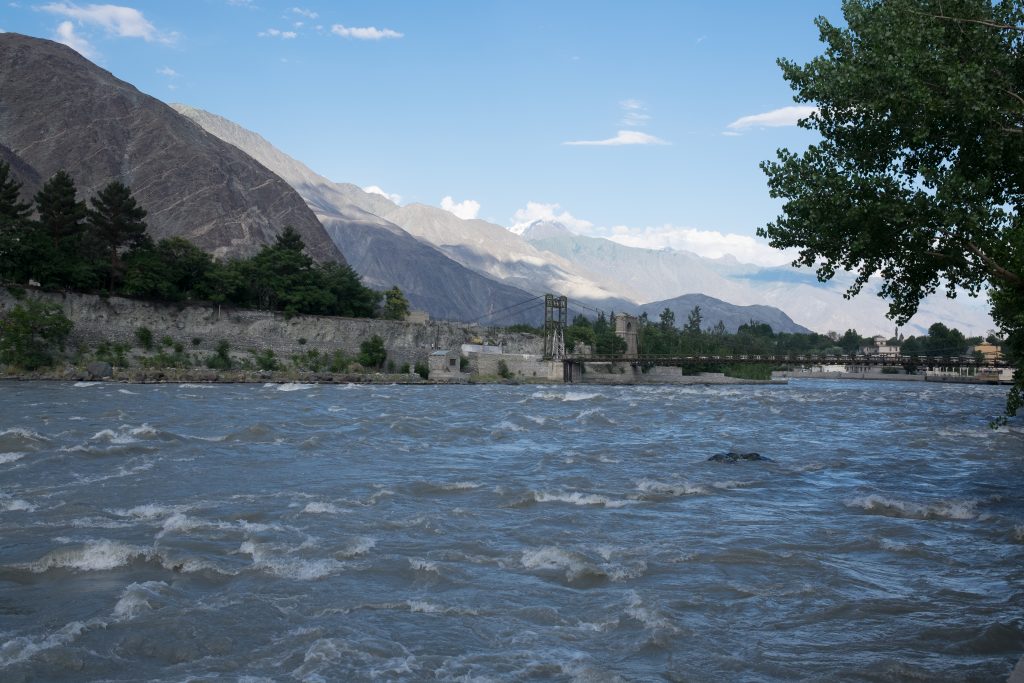
Gilgit River hurtling along the valley
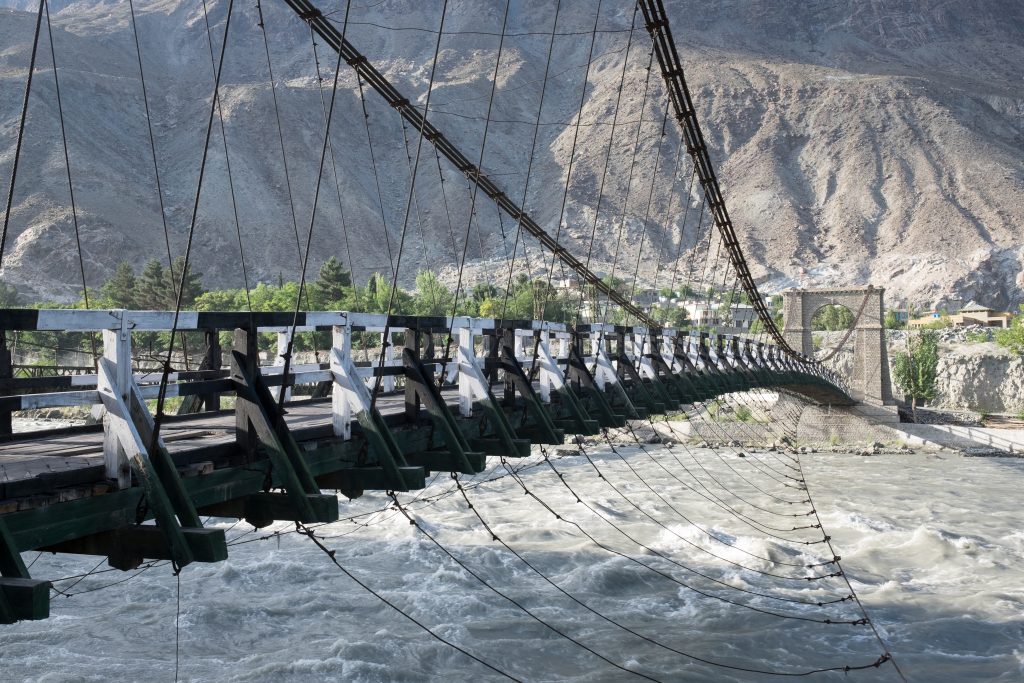
Bridge over the roaring Gilgit River
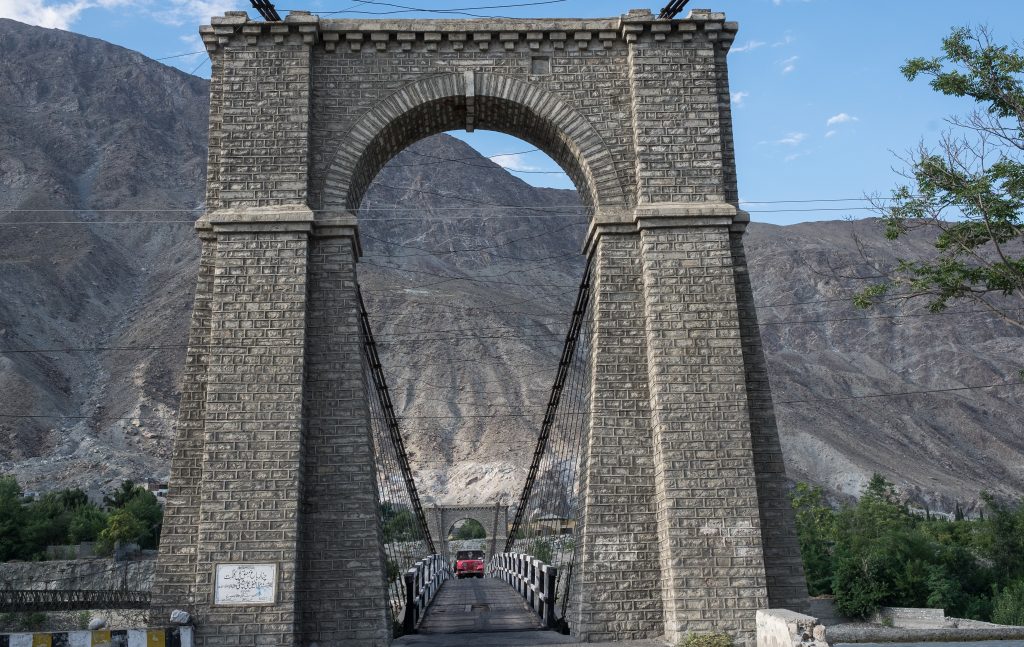
The bridges of Gilgit
The drive from from Gilgit to Karimabad in Hunza is truly beautiful. The Karakoram Highway winds through the mountains, at times barren and forbidding, at times dappled with green and at times snow-capped. We stopped at the Attabad Lake where the water is of a beautiful emerald color. The lake was formed when a mountain fell into the river during the 2010 earthquake and blocked it. There was tragic loss of life and displacement due to this transformation. Now the lake is a tourist spot and boats are available to take a tour and enjoy the serenity of the lake.
The other popular spot to take a break on the ride is the Rakaposhi Viewpoint. A number of food kiosks have been built on the two sides of a stream that emanates from the Gulmit glacier of Rakaposhi. The view point offers a spectacular, un-obstructed view of Rakaposhi that stands at an imposing 7,728 meters.

Rakaposhi as seen from the highway
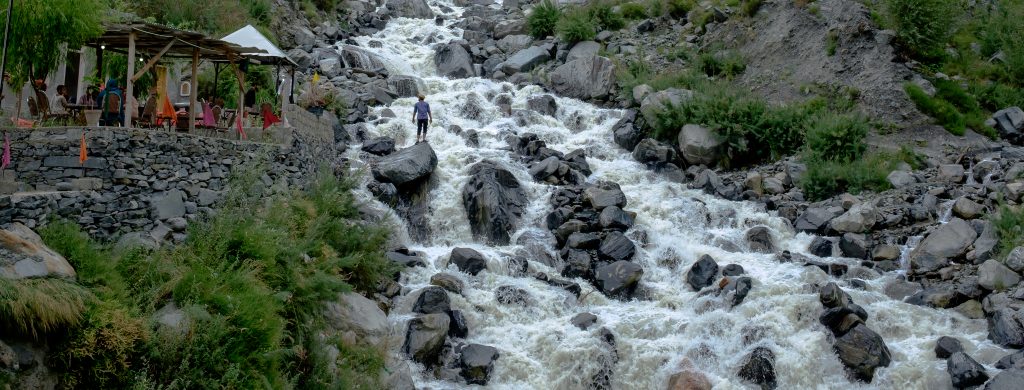 i!
i!
Stream flows from the Gulmit Glacier
The road to Karimabad is excellent and the ride is just two hours long. I left it to the driver Akhtar Hussain to suggest a hotel and he took me to Al-Barakat on the main (and the only) street in Karimabad. One look through the window of the room shown was enough for an emphatic yes from me. No room on any of my travels all around the world has ever boasted such a spectacular view. The room offered an unobstructed 180 degree view of the valley. Even the washroom offered the same view! This fairy-tale space was to become my home for the next three days.
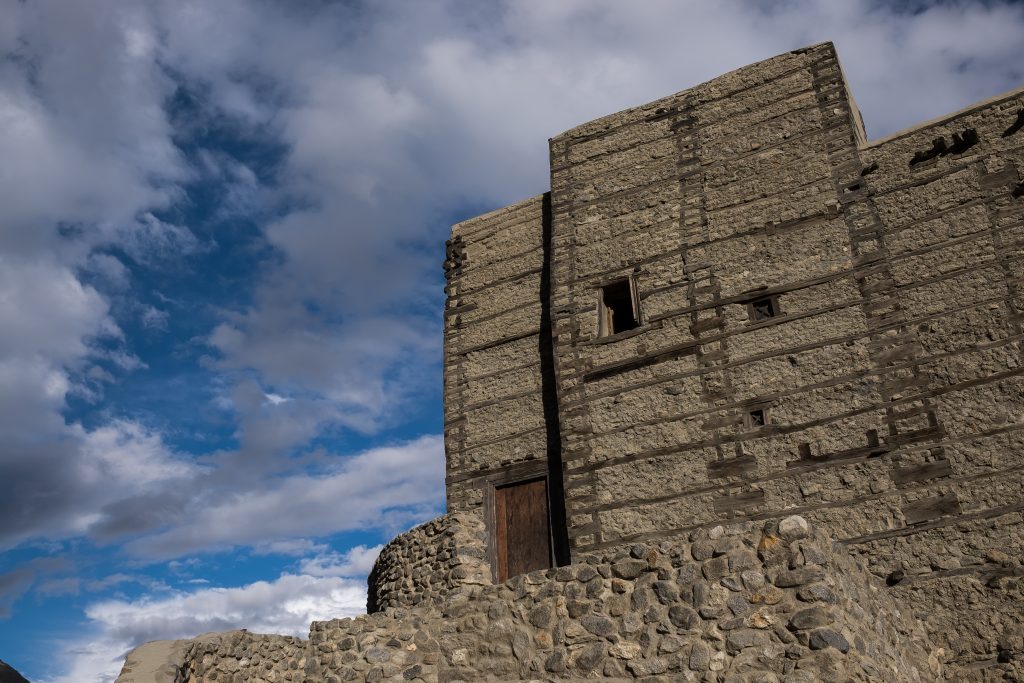
The mighty Baltit Fort
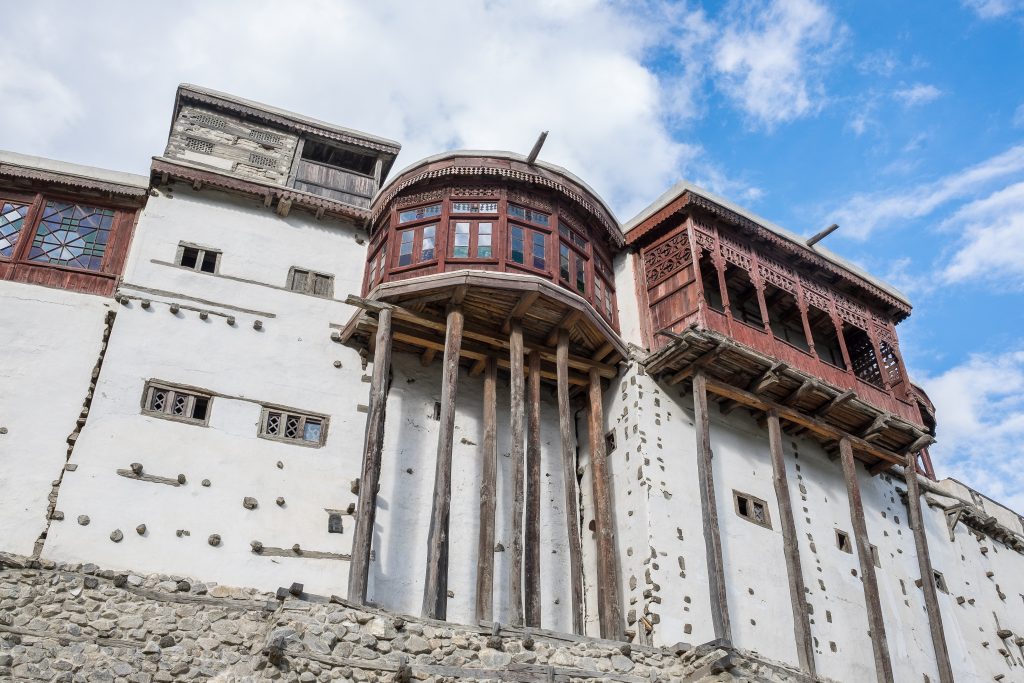
Baltit Fort, another view
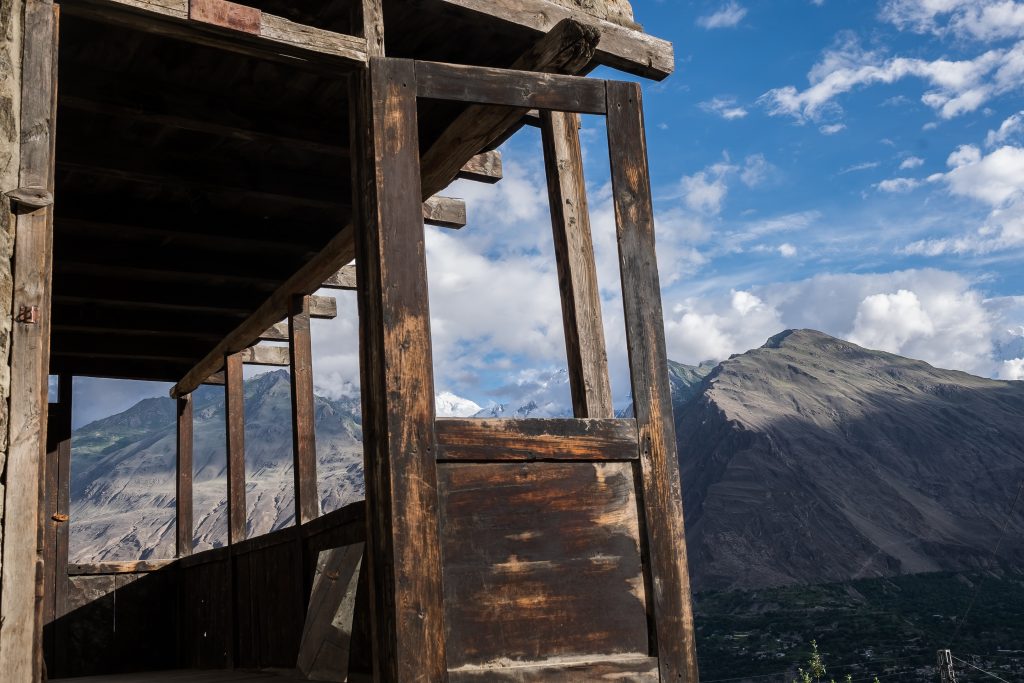
 The The man who rules the roost at the Baltit Fort
The The man who rules the roost at the Baltit Fort
Soon after checking in, I wanted to charge my cell phone only to discover that there was no power. It turned out that due to the breakdown of a power-station there is no power supply in the main lines Karimabad. The hotel switches on its generators at 7PM and it is kept on till 5AM. Hassan, the hotel owner, informed me that the unreliable power remains a contentious issue in Karimabad. In general, the infrastructure of Karimabad has not kept up with the increase in tourism. There is just one main street that frequently gets clogged due to two-way traffic. Many sections of the roads lack protective barriers to prevent a person or car falling below. Worse still is the garbage strewn all around by the tourists. The locals are very concerned about this issue. They have put up garbage boxes along the road but empty juice boxes, wrappers and cups are still seen flying out of the car windows.
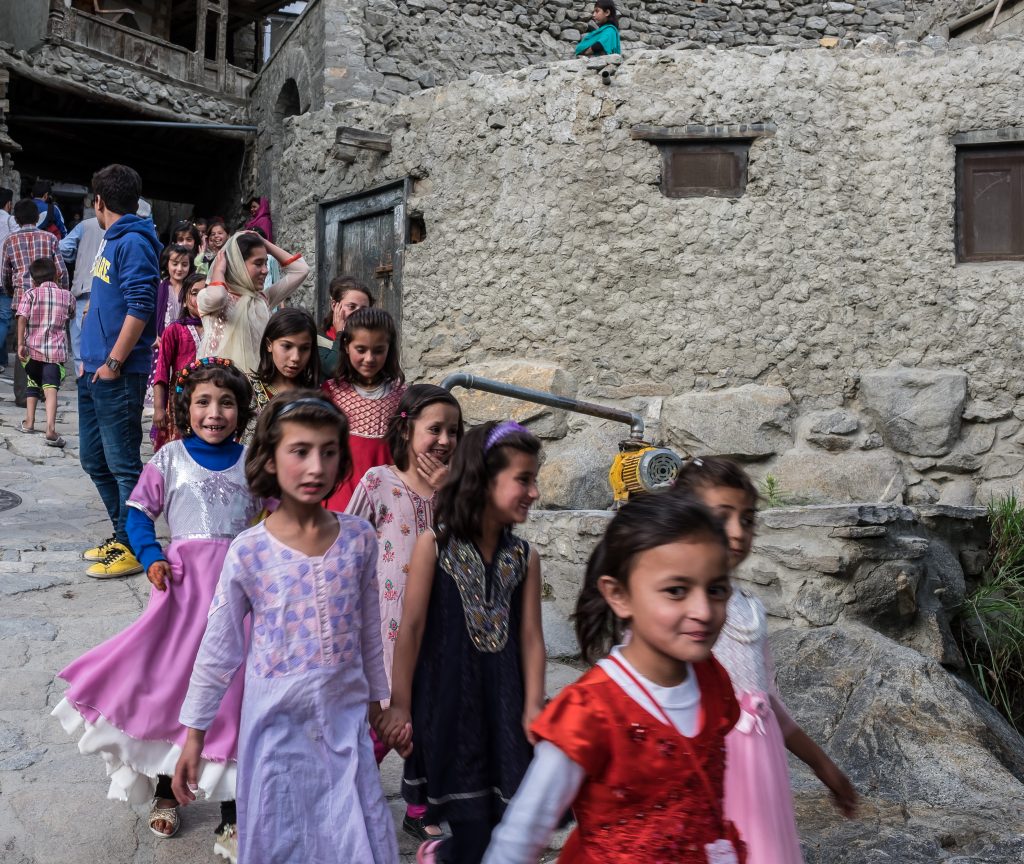
Innocence, charm and beauty on march near Baltit fort
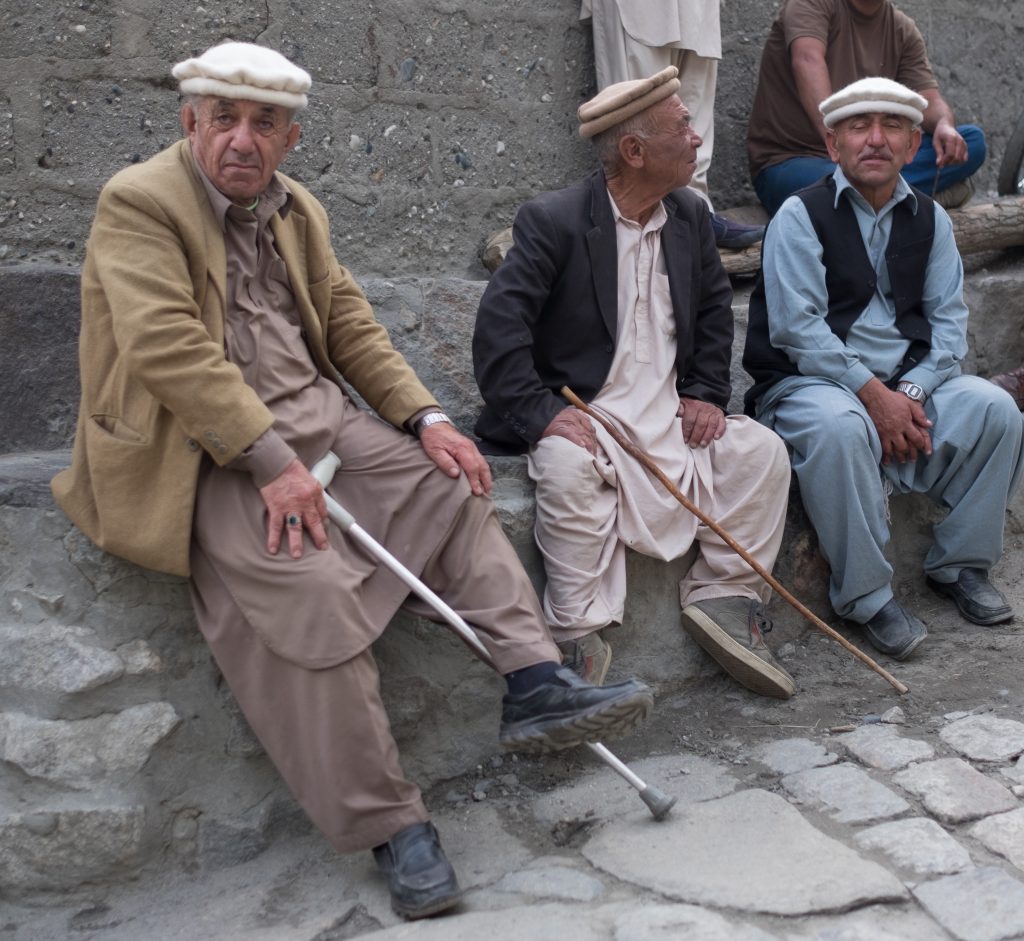
Grace and dignity endowed by the mighty mountains?
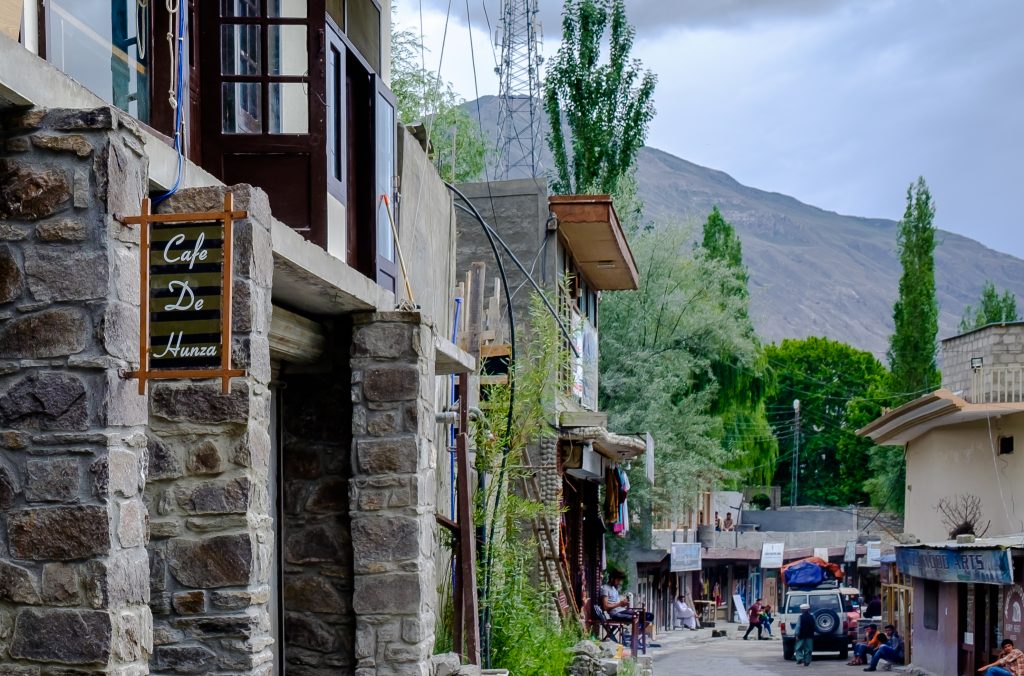
Café de Hunza, a landmark in Karimabad. Its late owner, Shaqat Bhai was a hugely popular person
Karimabad can take the title of a town that never sleeps. Even at 3 am, many restaurants and shops are doing brisk business. Local staples like jams, honey and dry fruit are very popular with the tourists. Made from fresh apricots, the jam I had for breakfast was as good as it gets. One very popular coffee and dessert shop is Café de Hunza which has a style that would not be out of place anywhere in New York or Montreal. The quality of the wide variety of coffee and dessert is excellent. No wonder this little gem of a place is packed at all times. There is a good choice of food available all along the main street. Some places (but not enough, I think) offer local specialties like Shab Shoroo (fried bread filled with minced meat) and a soup called Garma. A little place perched at the edge of the road run by three local ladies had such delicious food that the waiting time was over two hours!! One big surprise was that I had the best pizza I have had anywhere in my travels around the world. A place called Pamir Pizza on the main street near the Baltit Fort served me a pan pizza that stood out as a complete winner.
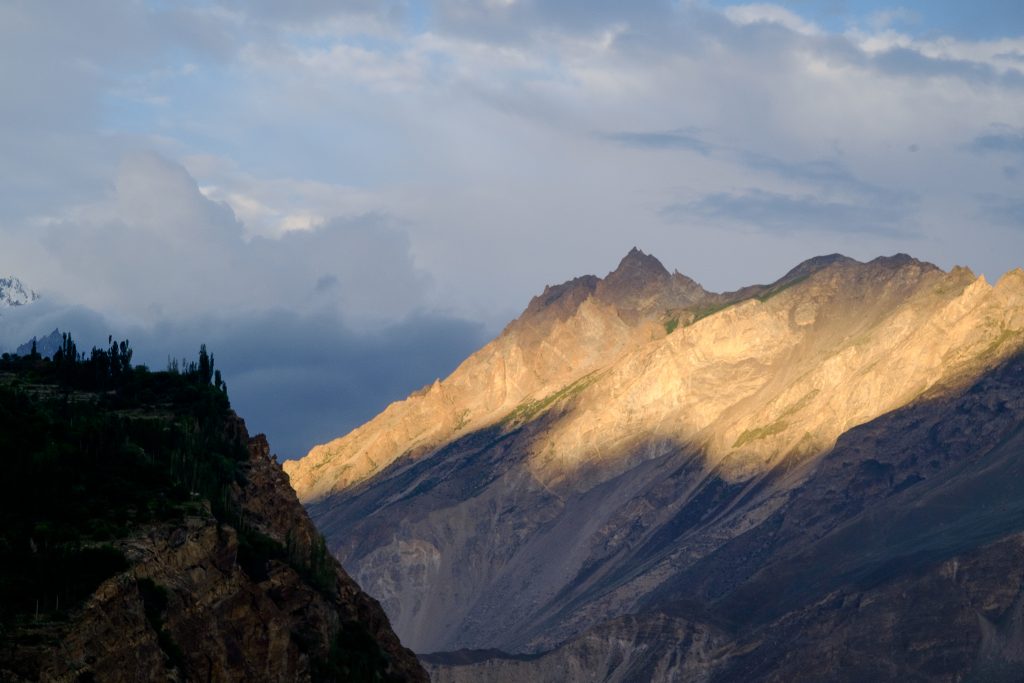
A visit to the imposing Baltit fort in Karimabad is mandatory. However, even more interesting is the Altit fort located about 2 kms from the town centre. It is a lovely walk to the fort as you pass streams and water falls to arrive at this 11th century structure. The fort is perched in the mountains 1,000 feet above the Hunza river and offers a panoramic view of the valley. The Fort was in a state of great disrepair when it was taken over by the Agha Khan Foundation. The foundation restored the fort and opened it to public in 2007. A wonderful surprise that greets you at the Altit Fort is the Altit Music School where young boys and girls learn to play traditional instruments. The sound of music emanating from the school added a magical touch to the serene setting.
Many young locals on seeing an older person like me walking offered a ride on their motorcycle. This brings me to a general point about this whole area: the people are thoughtful, gentle and polite. It is such a nice change from the “lower depths” of the country. Not once did I feel pressured to buy something or was I cheated. Of course, you are expected to negotiate on room rates and taxi fares but the process is very relaxed and pleasant.
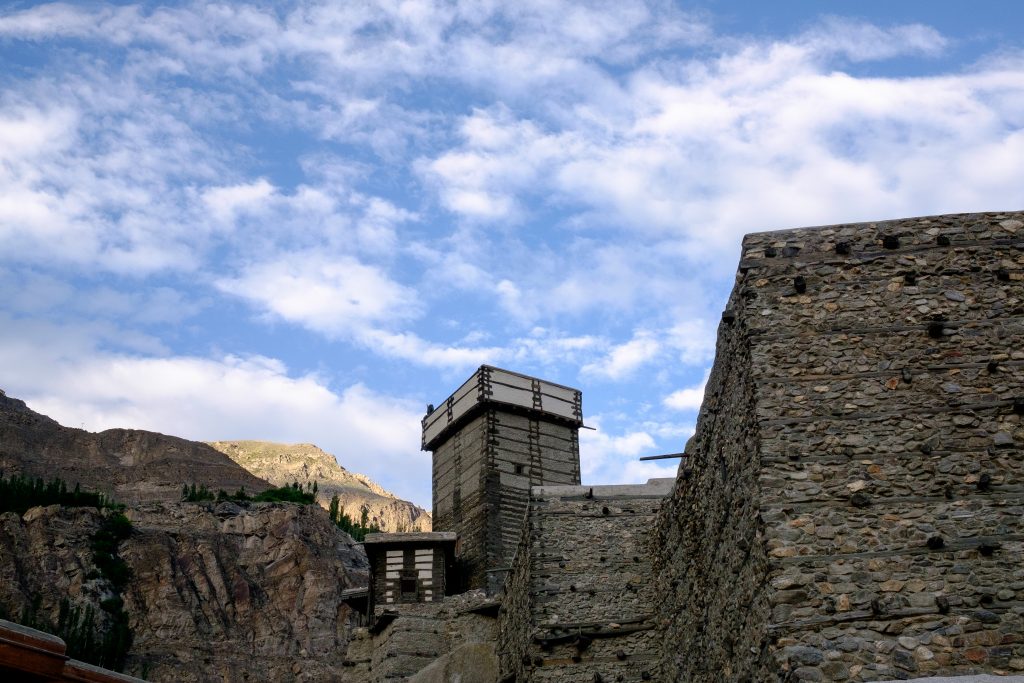 Hunza Altit Fort
Hunza Altit Fort
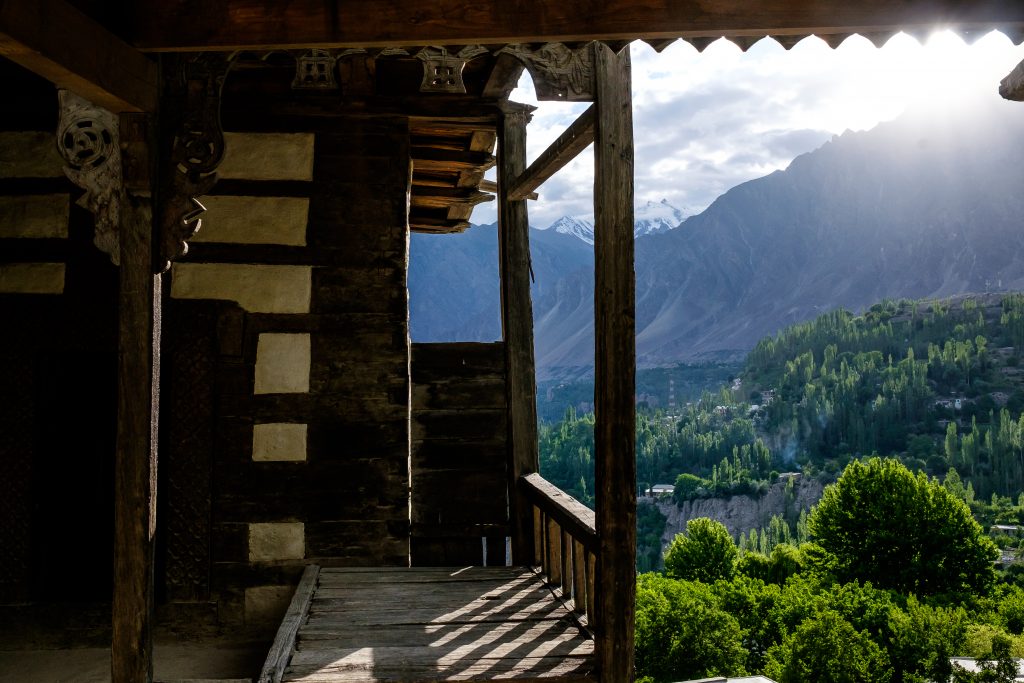 Balcony with a view at the Altit Fort
Balcony with a view at the Altit Fort
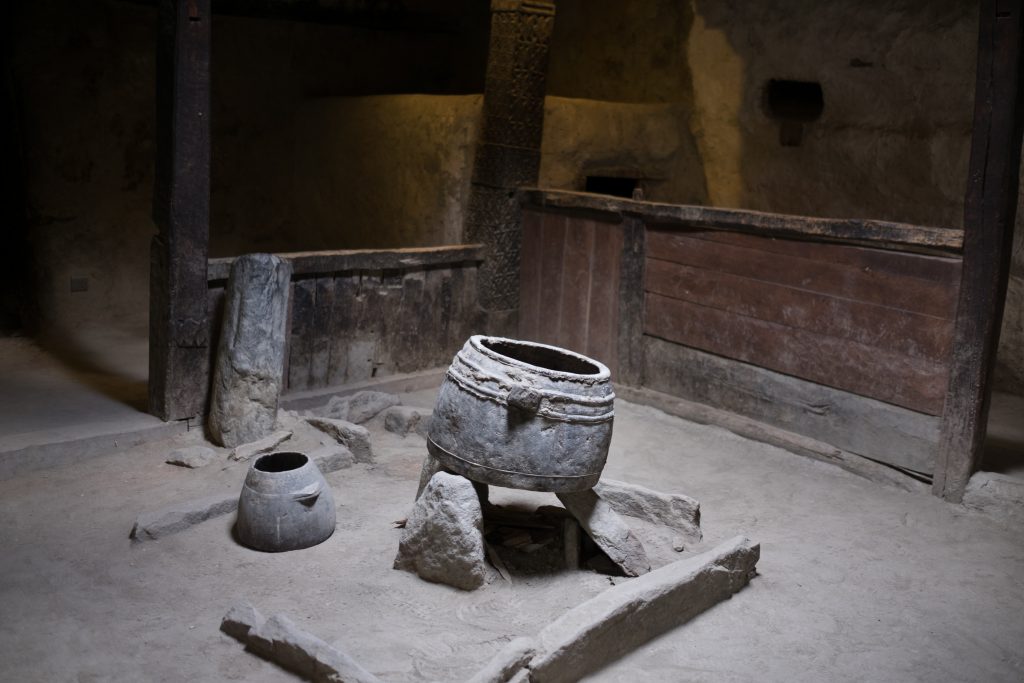
Pots and pans inside Altit Fort
I met a very unusual person on my walk to the Altit Fort. I had noticed some steps going up to what appeared to be a plateau near a little waterfall. It was indeed a flat space where a man had pitched a tent and was busy building something. Very quaint stools made of stone gave the place the appearance of a restaurant. It was indeed a future eatery as Piyar Karim, the man in the tent, explained to me. But he was no ordinary restaurateur but a scholar who had studied in the USA and had returned to his hometown. “The real purpose of this restaurant is to fund an institute next to it that will promote and research the endangered local language Burushushki”, he explained. He informed me that there are five distinct languages spoken in the Gilgit-Baltistan area (Burushushki, Shina, Balti, Wakhi, Domaki) in the short distance of about 120 kilometers. They are so distinct that the knowledge of one is not sufficient to help to speak the others. “Unfortunately, none of the local languages are taught in the school, and thus there is a serious danger that these languages will soon become extinct,” he lamented.
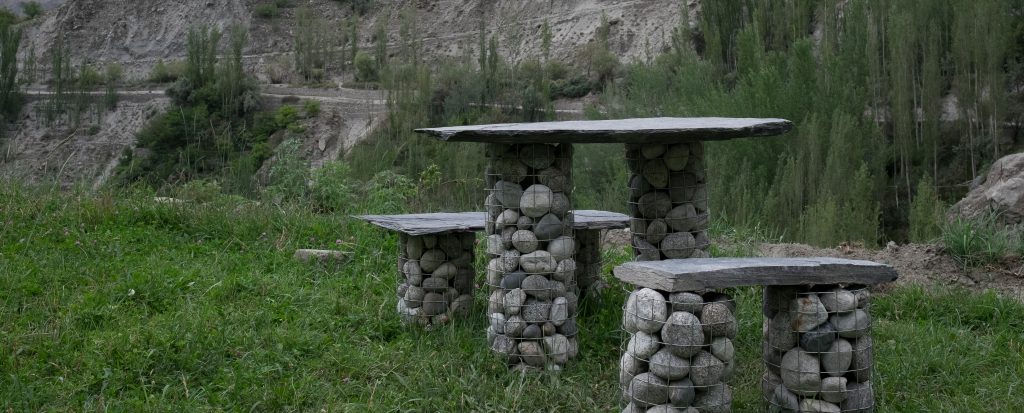
With “furniture” already in sight, the soon to be ready for business restaurant in Karimabad
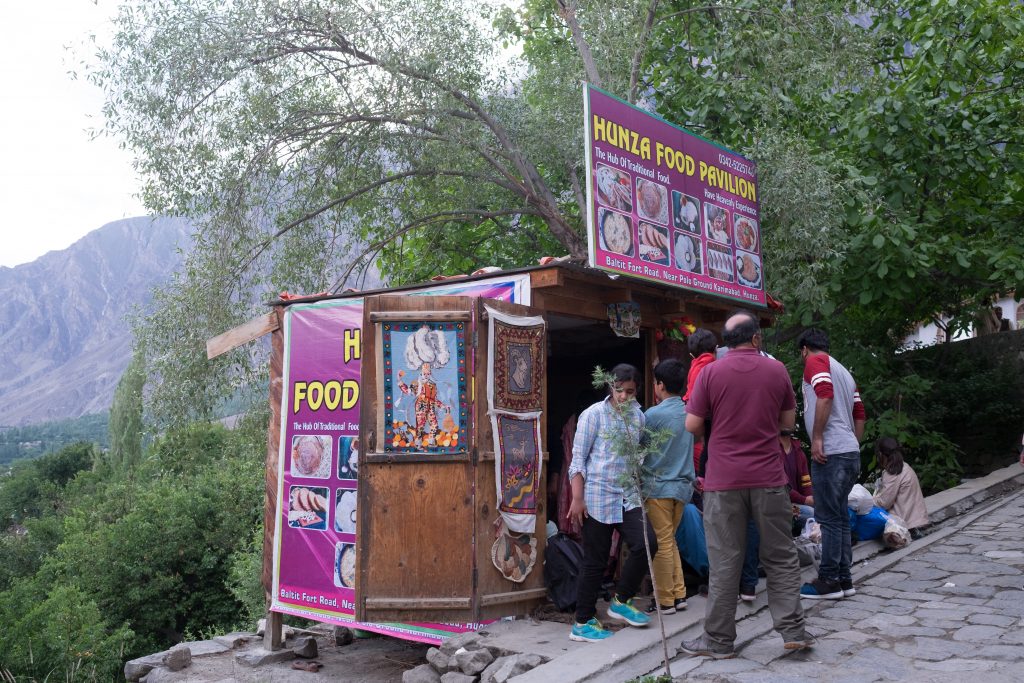
The best local dishes demand the longest wait at this tiny kiosk in Karimabad run by two ladies
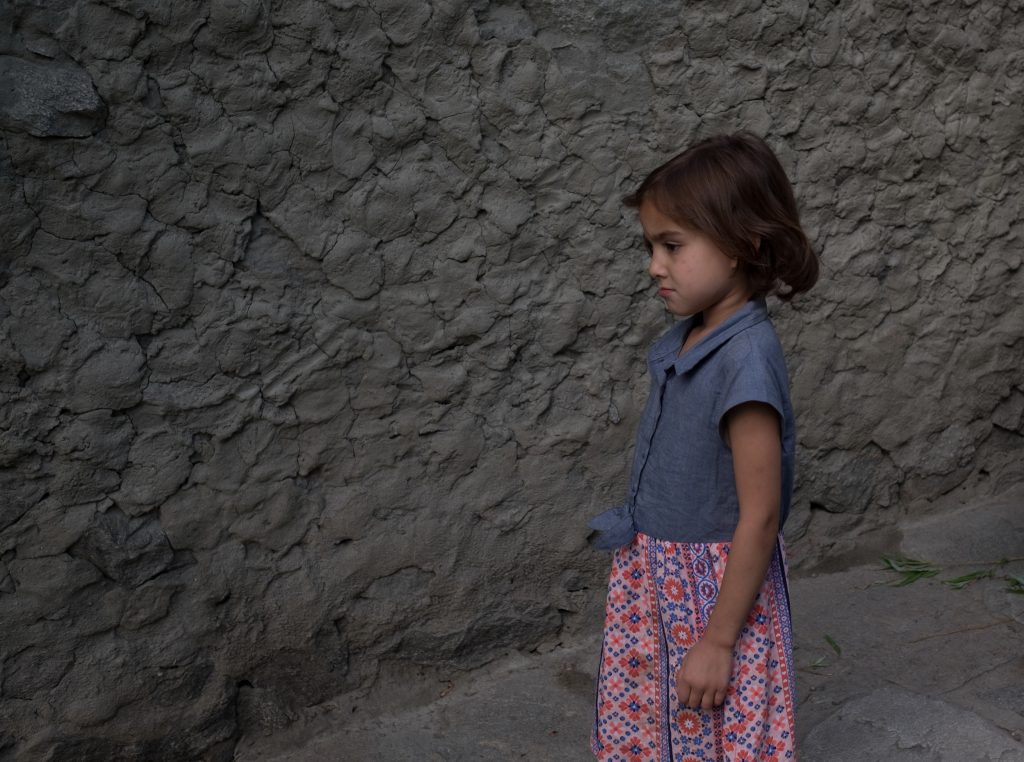
A child of paradise
After spending three days in Karimabad I was ready to press ahead. Hassan, the desk manager at Al-Barakat arranged a taxi to take me to Passu. The scenery becomes even more imposing as one drives up the valley. In this area, dominated by the Passu Peak (7,478 meters ) and its sister peaks and needles, small hotels are scattered along the KKH. There is no town as such. Staying in Passu is a totally different experience from that in the busy little town of Karimabad. Passu is for those seeking to get away from it all. I stayed in a very nice place called Ambassador Hotel that is run by two well educated brothers Ghadeer Shah and Rehmat Kareem. One could just stay put in a chair in the terrace and watch the high peaks all day long and feel no urge whatsoever to move! With no cell phone connection, TV or internet it is a perfect place for those wanting to write a book or simply seeking refuge from the world. A word of caution: make sure you inform your dear ones back home that you would be incognito for the duration of your stay there. This is something I ignored and my radio silence triggered some panic in Karachi.
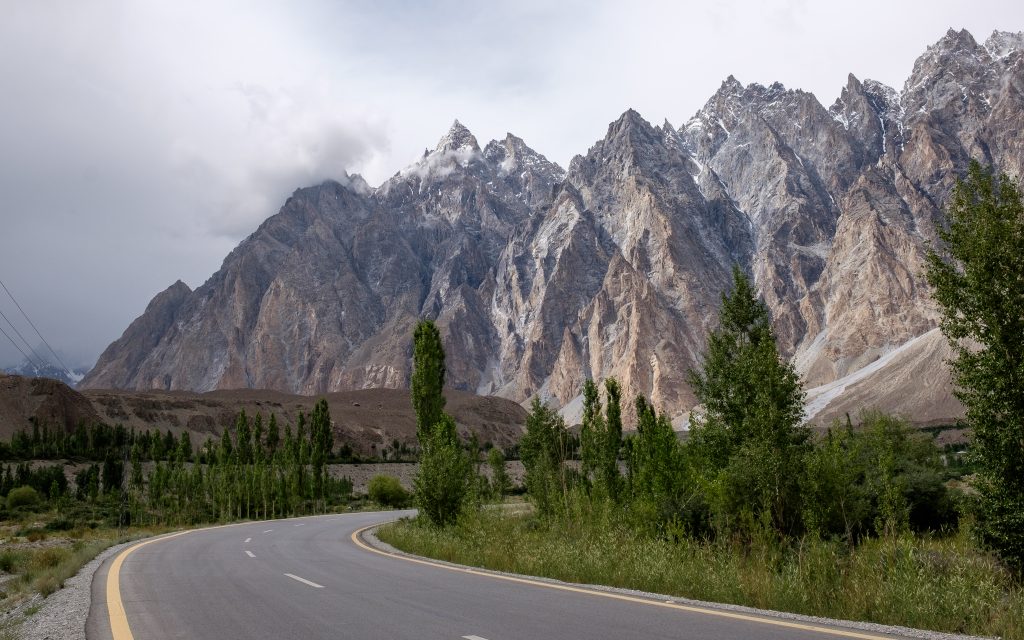
Passu: The curving KKH cuts through the mighty Karakorums
Food choices are limited at the hotels here but the staggering scenery makes up for it. A nice walk can be taken to the base of the Passu Glacier to get a great view of the Passu peak.
However, if you are travelling alone (I was the only tourist I saw on the trip who was travelling alone) it can get lonely soon at Passu. So better to go with a group and enjoy your own little slice of heaven perched in the lofty mountains.
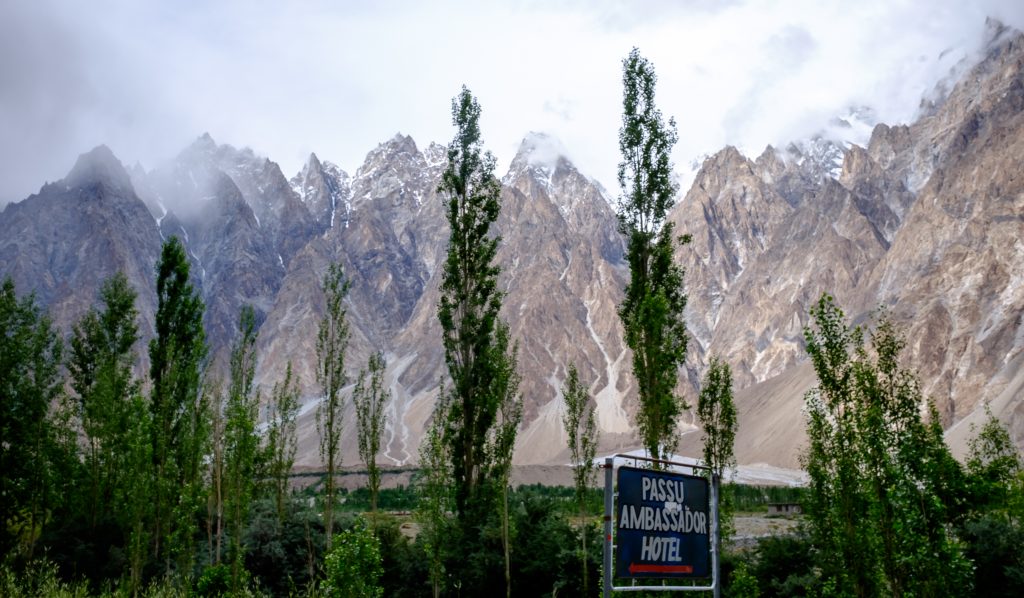
Passu: Here ye shall see no enemy but harsh winters!
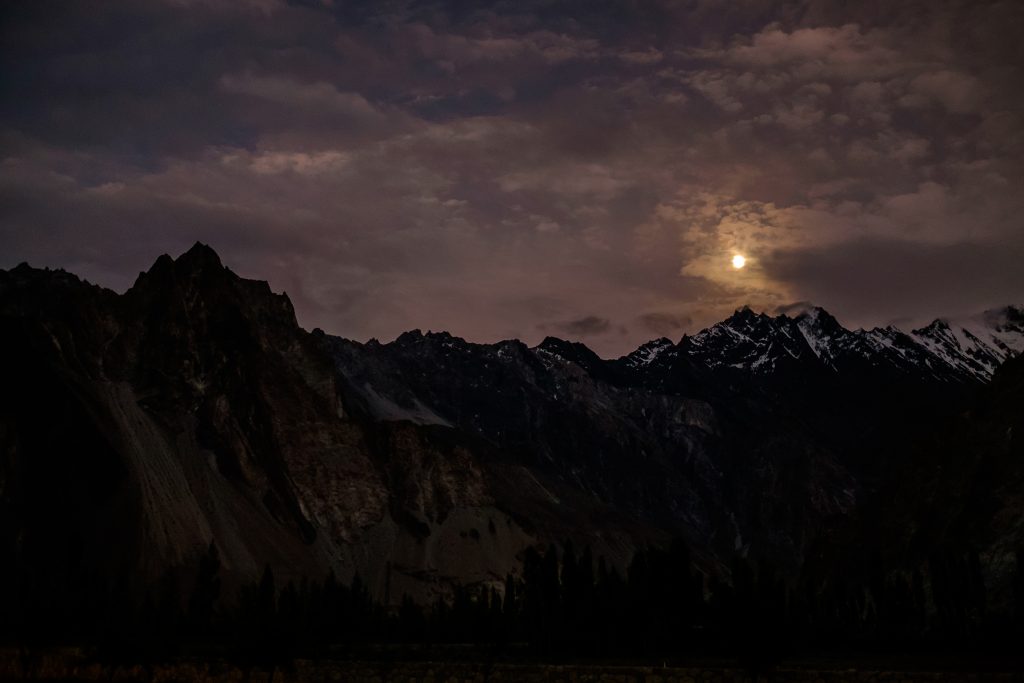
Passu by night!
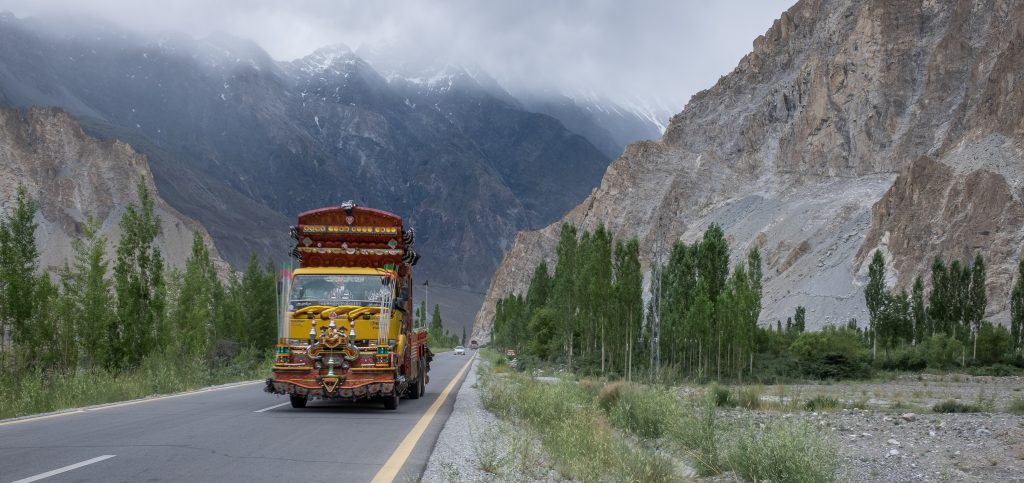
Passu: Goods truck travelling to the Pak China border at Khunjerab about 100 km away
I spent two very relaxing days in Passu just going for short walks and photographing the mountains at different times of the day and at night. The hotel served simple but well cooked meals that I thoroughly enjoyed.
Ghadeer Shah arranged for a taxi to take me back to Gilgit. The driver was a young man from Passu who was studying in a college in Rawalpindi and was back in his hometown for the summer vacations. Like most young men of Gilgit and Hunza, he was articulate and gave me a good summary of the politics of the area. He told me that Gilgit was a hotbed of sectarian violence before the government took the step of appointing an out-of-province police chief. Since these officers do not have local loyalties, they are seen as even-handed in dealing with sectarian issues. Most Inspector Generals of police now come from Punjab or Sindh. The young man had the usual point about the politicians getting elected and then doing nothing for the area.
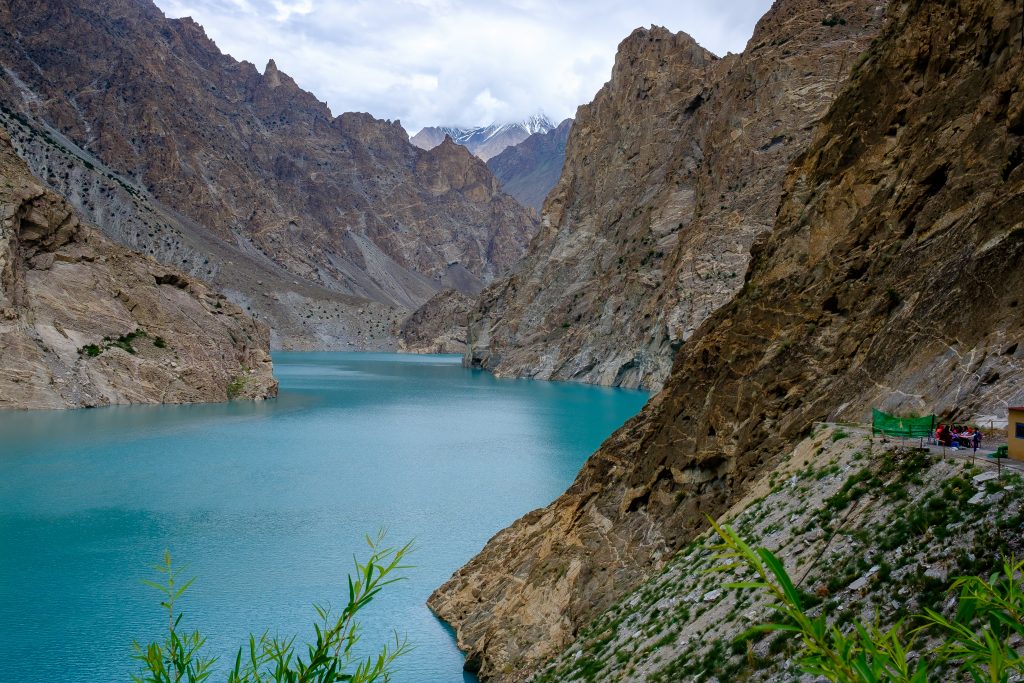
The serenity of Attabad Lake belies its traumatic birth in 2010 following massive earthquakes
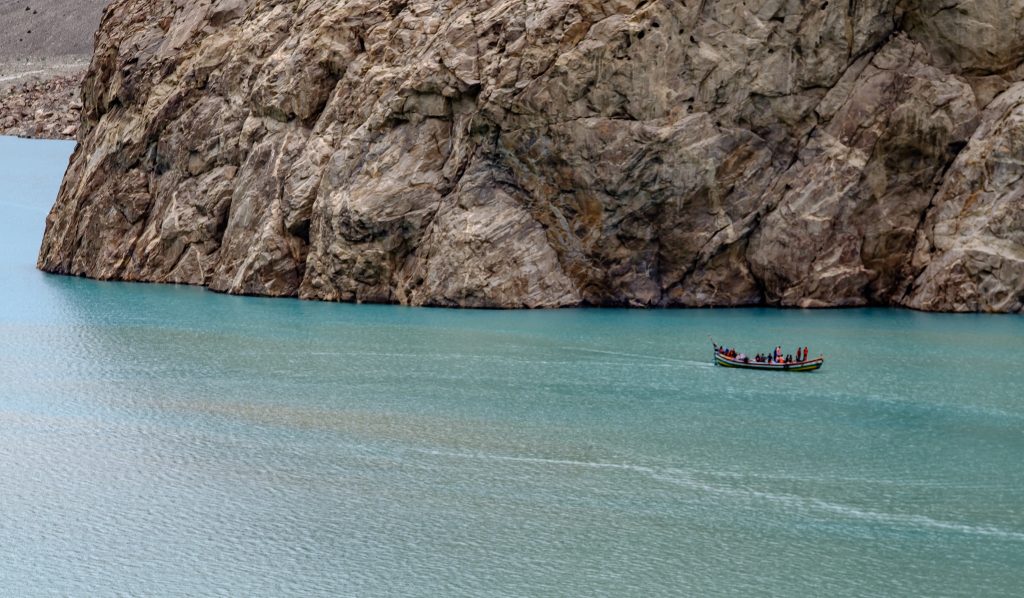
Boating in Attabad Lake
Back in Gilgit, I returned to the PTDC only to find it was completely booked. Here is a word of advice for travelers, especially during Eid holidays: Gilgit and Hunza can get very packed. Hotel owners told me of people having to sleep in their cars as there were no rooms available. Booking in advance is a good idea. Not finding a room in PTDC, I went to next door Hunza Inn. The place, which has been around for 30 years, was in pitiable shape. Dirty room, smelly blanket, broken plumbing, ceiling fan with no regulator, and insufficient lights was what I got for Rs. 2,000 a night. I slept poorly as it was too hot without the fan and too cold with the fan turning at its single breakneck speed.

Kaghan Valley, criss-crossed by numerous streams
Next morning my shared taxi person took 45 minutes to find my hotel and then another 45 minutes to find the hotel of the other 3 travelers. A shared taxi is an economical and comfortable way to travel back from Gilgit to Rawalpindi. Typical charge is Rs. 5,000 for the front seat and Rs. 4,000 for the rear seats. A hilarious situation developed when it turned out that all four passengers had been promised the front seat! After much argument, and with the owner pointing out to the other three that there is no way “Brigadier Sahib” could sit in the back, I managed to get the prized front seat. When the other three young passengers reluctantly agreed, the owner turned to me and said, “Colonel Sahib, please thank these gentlemen for being so nice!” It was a quick demotion in rank within 15 minutes but I was not complaining! So all in all, within a week I had been brought down from a General to a Colonel. Perhaps I would be a Captain by the time we reached Rawalpindi.
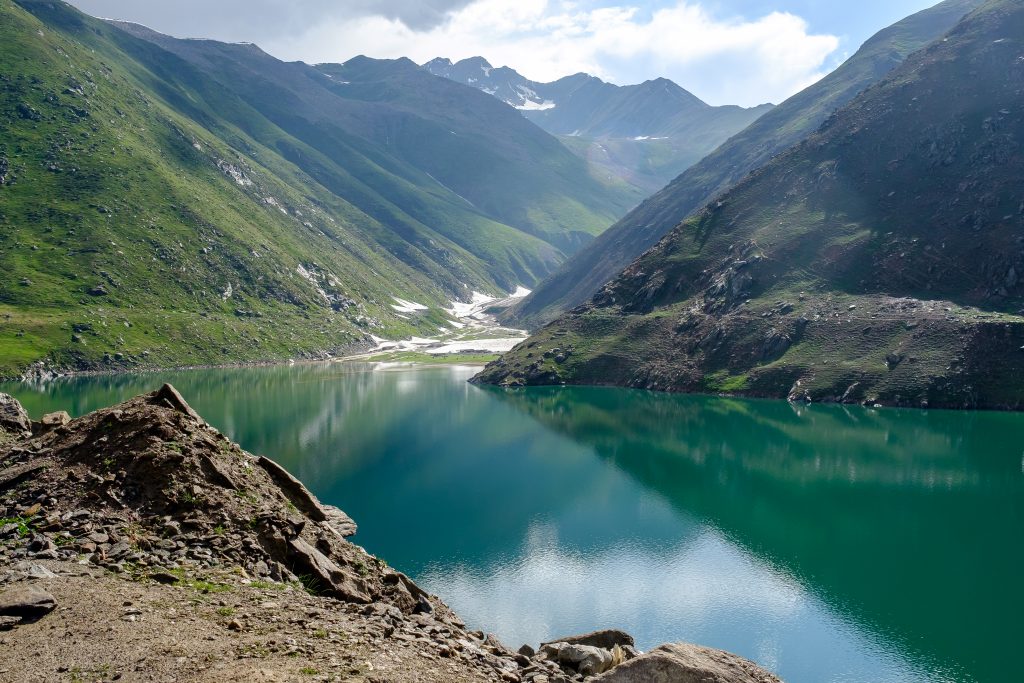
Lulusar Lake, Kaghan Valley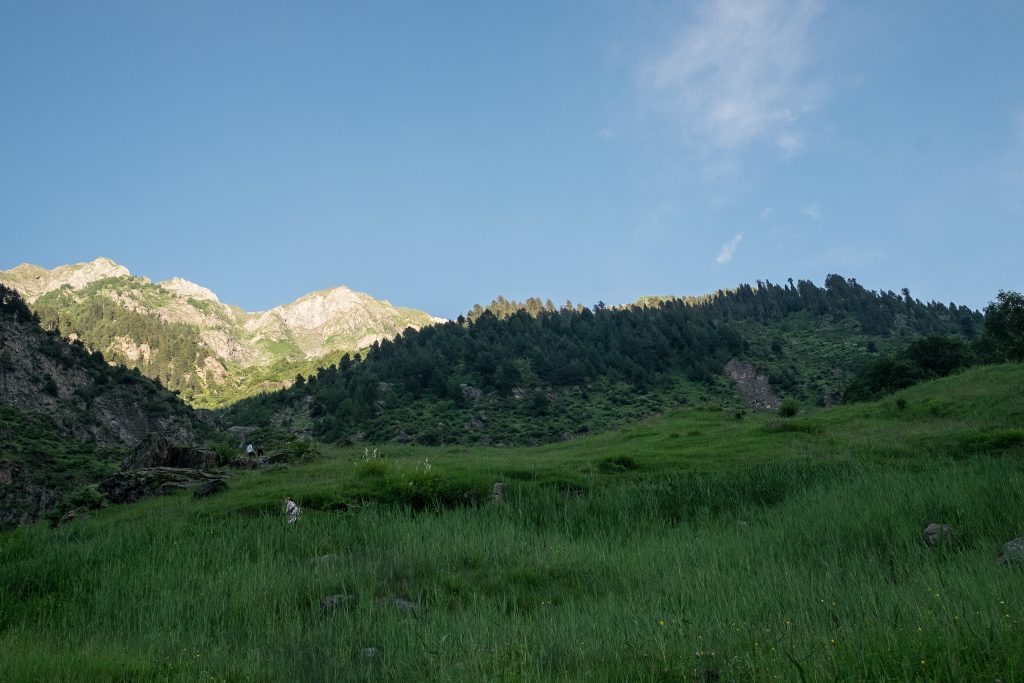
The lush greenery of the Kaghan valley is a big change from the rocky terrain of Gigilt
The drive from Gilgit to Rawalpindi is a longish thirteen hours but entirely worth it. The road climbs up to nearly 12,000 feet to the BabusarPass that takes you into the lush green Kaghan Valley to the Azure blue Lulusar lake, and onwards to Naran, Balakot, Manshera and Rawalpindi.
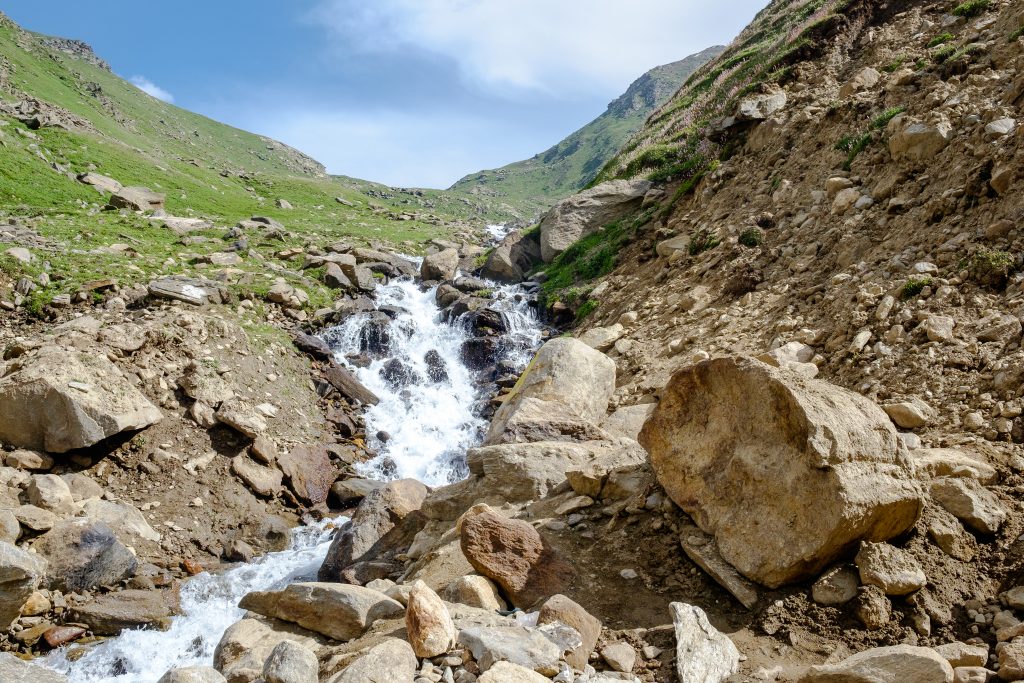
Frothy stream flows down from some distant glacier in the Kaghan Valley
While the landscape is incredibly beautiful the environmental degradation is heart-breaking. Kaghan has become another Murree. Hordes of local tourists, their vehicles, the hundreds of little shops and makeshift restaurants, the garbage strewn in the streams and on the roads, bode very poorly for the future of this little slice of paradise.
Nature has been very generous to our Northern areas, but as access is becoming easier through the construction of all-weather roads, these gifts from nature are under a serious threat from insensitive and indifferent local tourists. Unless a proper plan is instituted to protect these areas, we will be responsible for destroying some of the finest locales this planet has to offer.
Photos by the author
The writer is an engineer by training and a social scientist by inclination.



